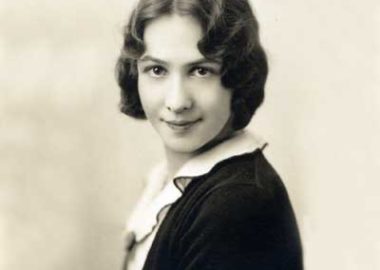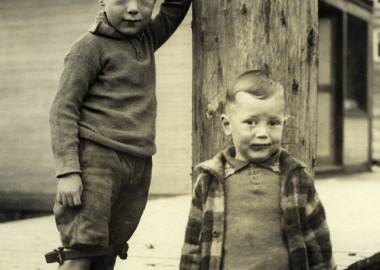We asked accomplished people from all walks of life to talk about the benefits of values-driven, authentic lives, and the meaning of legacy.

The Very Reverend Peter Elliott is not your average priest. A native of St. Catharines, Ontario, he arrived in Vancouver in 1994 to take up the post of dean and rector of Christ Church Cathedral, the cathedral church of the Anglican Diocese of New Westminster. In 2002, Elliott catapulted to international attention when the diocese announced it was authorizing the blessing of same-sex unions in its churches. Elliott, an openly partnered gay man, found himself as the highest-ranking openly gay cleric in the Anglican Church of Canada. Joining this social renovation was a project closer to home; the restoration and renovation of the cathedral building itself to a thoroughly modern facility.
ECHO STORYTELLING AGENCY: What does the word legacy mean to you?
PETER ELLIOTT: I think legacy is a gift we make for the future. It’s thinking about our activities, priorities and values in a the way that will benefit future generations. It means moving away from a fixation on the present and instead imagining a preferred future.
ECHO: What legacy did you receive from your family?
ELLIOTT: My parents both highly valued education. Their legacy was their desire to give their children a good education, up to and including post-secondary education. They also gave us the legacy of Christian faith. For them, it was important for us to be part of a faith community, to participate in that as we felt called and able. Lastly, they gave me an insistence on being a critical thinker — that’s kind of related to education, and it’s also related to Christian faith. They both approached Christian faith as a tradition in which we’re in a dialogue that’s ever-changing and therefore new — and, paradoxically, ancient and old. That’s in counterpoint to the idea of having to buy a whole bunch of predetermined ideas. Those are three of the legacies I received from my parents.
ECHO: Did you have any professional mentors? You didn’t have a traditional business career, obviously.
ELLIOTT: Yeah, I had a number of them. I studied at the Episcopal Divinity School in Cambridge, MA, with the Harvard campus at my fingertips and footsteps. It was a great privilege. Interestingly, the priest whose teaching and mentorship have stayed with me through the years was working in the area of applied behaviour sciences. You have to understand the context. This was the late 1970s. His name was John Swanson, and he was interested in how human beings relate to each other. So he developed a course that I took that has been of immense practical help to me. Conversely, he was also a mystic. He ended up founding a religious order called the Order of Julian of Norwich, where he lives now as a solitary and took on the religious name of John Julian. I’m still in touch with him all these years later.
Sometimes someone recognizes in another person gifts and qualities they see in themselves and want to nurture. I think this is true for a lot of people about their sort of mentoring relationship, and it certainly happened between John and me. He saw a lot of thoughts and inclinations I had as being very similar to ones he had, so he gave me extra time and that was great.
I could go on for days about mentors, but I’ll just do one more: David Somerville. David was well into his retirement when I arrived in Vancouver in 1994. He was in his late 70s at that point, practising tai chi every day, and he decided to be friendly to me. That meant lunch, once a month, for the fifteen years that he was able to do that, so well into his 80s. I thought that he was giving me a great gift by hanging out with a young guy like me over lunch and usually a bottle of wine. And indeed he was. But now that I’m older, I realize that he was very wise in developing friendships with younger people. It keeps older people alive. He was the kind of mentor that I could say anything to. He would listen without judgment and give helpful, wise counsel.
The things that seem, especially when you’re younger, to be the biggest obstacles, may turn out to be the biggest blessings.
ECHO: What’s the flip side? What legacy do you think that you’ve passed on?
ELLIOTT: I think I’ve managed to leave a legacy on two fronts. I’ve managed to have an enjoyable and, I hope, faithful career within the clergy as an openly partnered gay guy. There weren’t people like me when I was younger. I hate the word successful, especially when applied to the church, but it’s been high-profile. With a lot of the more public coming-out that I did in the early 2000s, my instinct wasn’t motivated out of concern for me or my generation — it was for a younger generation. To say it’s possible to be gay, partnered, married and active in the life of the church. I hope that has opened some doors. And I hope that now we’re even more nuanced in our understanding of gender and identity, not only for gay and lesbian kids but trans kids and questioning kids and two-spirited people from these communities.
The irony about all of this is that when I was deciding about whether to be ordained, I thought the reason that I couldn’t get ordained was that I was gay. But it turns out that it’s been a gift. The things that seem, especially when you’re younger, to be the biggest obstacles, may turn out to be the biggest blessings.
ECHO: That’s incredible.
ELLIOTT: I don’t know how that works. It’s weird. But that was my experience.
The other piece, of course, has been getting Christ Church Cathedral in good enough shape to last another couple of generations. When I arrived here in 1994, the place was really a mess. It was really nobody’s fault — there wasn’t a lot of money for the work. The congregation was much more focused on what they were doing as a Christian community in the community than on the building. And that’s the right instinct for a Christian community: we’re not about building shrines; we’re about assembling the people to do what we believe God is calling us to do in the world, which is to make the world a place where peace, justice and human equality can flourish.
But we were getting hampered. Buildings are expensive, and old buildings are particularly expensive. In 1994, I took a parishioner named Ian Birtwell out for lunch saying we needed to raise $500,000 to do a little bit of work. I was a little off. It’s turned out to be over $20 million over 20 years. My inclination has always been to get this place ready for my successor, so that my successor won’t have to worry about the building, but just the work. This intersection, Georgia and Burrard, is arguably the most significant in Vancouver. And right here, the Anglican church has a presence in the heart of the city. It’s an opportunity. It’s a gift and legacy from the past. Henry John Cambie, the first warden, and those who founded this church — they didn’t know they were doing that. They thought they were building a little parish church on the corner.
The congregation has grown significantly in the 22 years I’ve been here: it’s larger, it’s more diverse, it’s capable of holding more diverse viewpoints. When I arrived, it leaned well to the left on the political spectrum, which is kind of where I am personally, but sometimes the more righteous left has attitudes toward business and industry that I don’t think are fair. We’ve worked to stay engaged, inviting but also retain our prophetic edge. To be open to new ideas, which has a lot to do with listening carefully to what the idea is that gets presented and then asking questions to figure out the values behind that new idea.
ECHO: How do you remain open to new ideas while hanging on to core values?
ELLIOTT: The longer I’ve been here, the more open I’ve become to new ideas, because that’s the lifeblood of an organization. Sometimes I want to dismiss a new idea out of hand. I just don’t like it. But when I’m operating with the utmost integrity and authenticity, I can ask the curious questions that follow the presentation of a new idea to figure out what’s driving that idea. I can then see how that idea interacts with my own ideas and values. And sometimes that challenges my values. It makes me think, “Oh, I need to think again about what’s driving my decisions.”
I describe myself as being plagued with ideas. The staff here get very nervous sometimes. But knowing now that not all my ideas are good ideas, when I come up with an idea, I appreciate folks asking questions and pushing back. Sometimes when you find out that this has come up because I value X and Y, then it’s not the idea that’s important. Something might emerge out of that conversation that your idea brings about.
The staff here get very nervous sometimes. But knowing now that not all my ideas are good ideas, when I come up with an idea, I appreciate folks asking questions and pushing back
ECHO: How can we translate values to the next generation?
ELLIOTT: Hmm. That’s a good question. In terms of the life of the church, I think a lot of values get transmitted by the lyrics of hymns.
ECHO: Is there one in particular?
ELLIOTT: A whole bunch of them. All the hymns that have to do with justice and equity and human flourishing have to do with praising God, which takes us out of our egocentric selves and into a deeper, more complex reality and mystery.
We model values as well. I’ve spent a fair bit of time with Ted Scott, who was the primate of the Anglican Church of Canada from ’71 to ’86, over the years, especially when I was a younger person. He was very open to having young people around. His view was that values are how you behave and how you make choices — more than what you think you think or say you believe. You can say, for example, that it’s important for you to honour seniors or it’s important for you to act respectfully and kindly toward children. You can say all those things, but what really transmits is people’s experience. When you’re a priest, everybody looks at what you do. I don’t mean that in a egocentric way, but it comes with the role. So I can say it’s important to visit people who are in the hospital and not let them get isolated. But if I’m not doing that, it doesn’t mean anything. I think values are transmitted more by behaviour, both good and bad. The journey of a life is to get alignment between what I think I think and how I behave, so there’s a coherence to what I say and how I behave.
For instance, one of my values is to visit the sick. There’s the world of the well and the world of the sick. Both worlds live as if the other doesn’t exist. So when we’re in the world as you and I are now, thank God, we’re healthy. We’re well. We can go days without even thinking about hospitals filled with people undergoing amazing procedures and all that stuff. But I’ve found that I feel like life isn’t quite as full if I’m not visiting people in the hospital. I think something is missing. Believe me, having to get into the hospital to visit people is always a struggle. I hate it. I don’t like hospitals. I get OCD with those damn hand sanitizer things because I worry so much about infection and contagion; by the time I’m home, my hands are chapped! But for me it’s really important to have that whole experience of life — not to put them into two camps, one of the sick and the other of the well.
ECHO: Best book ever?
ELLIOTT: Well… I could do the desert island question, right? “If you were to take one book…” I’d take the Bible. I’m not saying that in a Donald Trump kind of way. It’s simply because the Bible isn’t actually a book, but a collection of books. You always have a library and the texts are inexhaustible in their meaning and complexity.
The other one is a crazy thing, Robert Persig’s Zen and the Art of Motorcycle Maintenance. Again, I’m a creature of the late ’70s. That book came out when I was at university, while I was doing my undergraduate degree. I was in English literature and philosophy, and my particular interest in philosophy was ancient philosophy, Plato and Aristotle and the early humanists. Persig pulled together one of Plato’s great dialogues with the Zen experience of travelling across the United States and of being on an incredible spiritual journey in just a very imaginative way. He linked together a lot of the worlds that I care about.

ECHO: Is the renovation of Christ Church Cathedral Vancouver your tangible legacy?
ELLIOTT: Oh, yes. It’s turns out this has been my life’s work — 22 years and counting. I value the aesthetics of the building greatly, but I’m also practical about things and some of the practical things that work here just delight me. Yet the building is just a container for the community, and that the community has been so progressive and continued to push new boundaries within the context of Anglican Christianity — that’s when we get intangible. That’s the legacy beyond the building.
Find out more about the restoration of Christ Church Cathedral here.
We’re doing this #GoodAncestors project to celebrate the wisdom of those who’ve gone before. The power of story only grows over time. Hard-won lessons, shared through the ages, keep next generations on the straight and narrow, and lead our children and grandchildren to grow into their best selves. A lesson we’ve learned over hundreds of memoir projects: values, shared from one generation to the next, resonate with ever greater meaning and effect.
We hope this #GoodAncestors series will inspire you as well, and light the fire for your best life.
For more Q&As in this series, visit the #GoodAncestors page.





